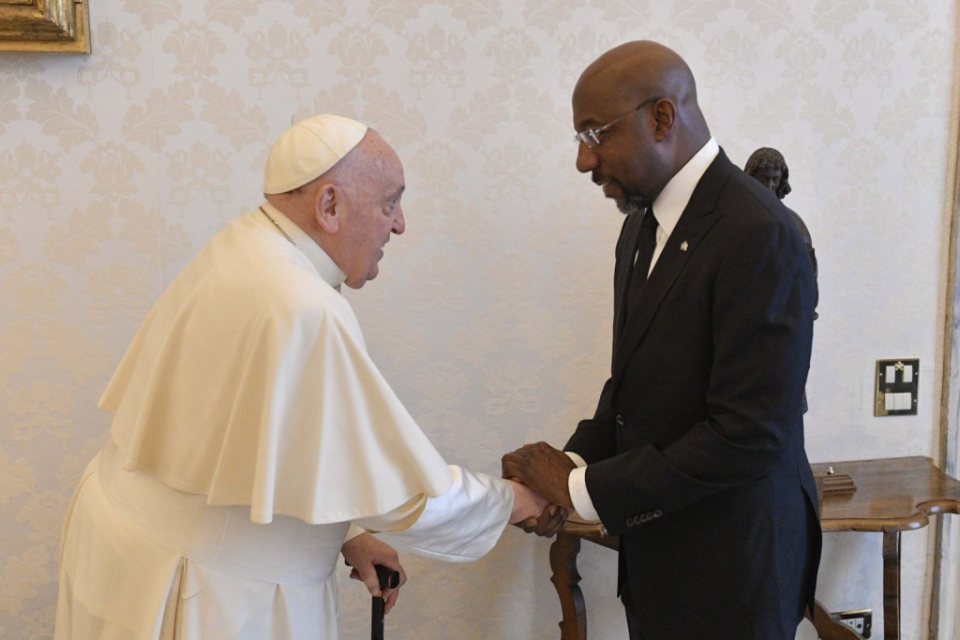Is the Vatican Smothering Its Pro-life Office with a Seamless Garment?

Boy Scouts Will Allow Girls to Join
October 12, 2017
Reluctant Prophet – The Story of Jonah
October 12, 2017
By Jason Jones & John Zmirak, The Stream, Oct. 12, 2017
LifeSiteNews has issued an alarming report on the official Vatican office that sets the tone for Catholic pro-life efforts worldwide. That’s the Pontifical Academy for Life, whose staff Pope Francis mostly purged and replaced, in some cases with pro-choice thinkers. It now seems to have embraced the “Seamless Garment” ideology of the late Cardinal Joseph Bernardin.
The pro-life group C-Fam cited a recent statement by the head of the Pontifical Academy for Life:
Being pro-life requires the academy to “re-think the semantic value of the term life,” said the President of the academy, Monsignor Vincenzo Paglia, during a press conference on Monday.
He said there were no plans to celebrate the 50th anniversary of the papal encyclical Humanae Vitae (on Human Life) next year and that the academy was instead opening “new frontiers for debate,” mentioning specifically the environment, migration and arms control.
The Mindless Garment
We have warned about this before at The Stream. The Seamless Garment is a leftist utopian wish list with little connection to real Christian morals. Its proponents pretend that open borders, carbon divestment, and gun confiscation are all just like abortion in that:
-
The correct Christian position on them is clear and unambiguous.
-
The policy implications of how to act on them are obvious and unarguable.
-
They are of all of equal moral importance.
None of these statements is true. Not even close. The Seamless Garment was a handy political dodge for pro-choice liberals who wanted to keep on collecting Catholic votes. It falsifies Christian social teaching. It dissolves the rights of unborn children like a pinch of salt in an Olympic swimming pool of dubious progressive “reforms.” They share just one thing in common: more power for the government.
The Seamless Garment was a handy political dodge for pro-choice liberals who wanted to keep on collecting Catholic votes.
Let’s say we’re just kidding around on the abortion issue. And we really don’t care what happens to unborn children. Then that’s just fine. A nihilist friend in college once quipped, “They’re only babies.”
What If Killing Babies Is Uniquely Evil?
But what if we were serious? What if we really thought that killing almost a million American children a year for our sexual convenience was morally … problematic? That it was just as bad as transphobic children’s books? Maybe worse than white ladies making tacos?
In that case, we wouldn’t cover up the death of the innocent with a moral fog machine. We would focus on it as seriously as the gun lobby and the pro-Israel lobby do on their (just) causes.
We would act like … William Wilberforce.
How Britain Became Christian Again
Eric Metaxas told the story better than we can. In his powerful book Amazing Grace, he described how Wilberforce and a coalition of like-minded Christian reformers changed Britain. They confronted a thoroughly rotted social elite. A fatally compromised Christian church. “Respectable” gentlemen exploited poor women as prostitutes, and society just winked. Corrupt politicians took payoffs to give special privileges from the government to cronies in private business. Anglican priests and bishops preached not the Gospel but blasé Enlightenment platitudes. Some even seemed to be Deists, preaching that God is a bored absentee landlord.
Help us champion truth, freedom, limited government and human dignity. Support The Stream »
But worse than all these evils was one. It stood out above all the others. Great Britain was enriching itself through the slave trade. The organized kidnapping, beating, rape, and forced labor of millions of Africans fed the country’s lucrative colonies in the Caribbean. You know those wigged and powdered lords and ladies who nattered about “the rights of man” in glittering parlors? They paid for their costumed balls with blood money. Hundreds of thousands of Englishmen relied on income from sugar plantations in Jamaica and Barbados. Powerful members of Parliament defended the slave trade as vital to their constituents.
Broad-Based Reform
Yes, Wilberforce did lead a broad-based movement for the “reform of manners.” That didn’t center on etiquette. It was a cultural call for the nominal Christians of Britain to live like real Christians. To care for the poor. To be faithful to their marriages. Even to pay their workers fairly. And as Metaxas documents, that movement made a vast difference. It soon became shameful to mistreat your tenants and workers. Mass revival movements brought the Gospel to rural areas where Celtic paganism still lingered. Methodist chapels helped young men stay sober and young women stay out of the brothels. While France lurched from revolution to revolution, Britain pursued peaceful reforms.
First Things First
But first, Wilberforce confronted the slave trade. He knew that it was different. There were no shades of gray on the question. He lived to see not just the slave trade but slavery itself outlawed in the British empire. Britain went from being one of the main exporters of slaves from Africa, to the global police force suppressing the Arab slave trade with cannons and soldiers.
How did he manage that? He wielded the pivotal virtue of prudence. Instead of grandstanding to the public and issuing utopian manifestos about all social evils, he focused his efforts on the greatest one. He separated his crusade against the slave trade from his broader Christian agenda. His campaign focused narrowly on the evils of slavery, the cruelties of plantations and the deaths in the Middle Passage from Africa. He led a boycott of sugar, which fed the slave trade’s profits. He took Englishmen on tours of former slave ships, and sponsored testimonies by ransomed slaves.
Instead of grandstanding to the public and issuing utopian manifestos about all social evils, Wilberforce focused his efforts on the greatest one. He separated his crusade against the slave trade from his broader Christian agenda. His campaign focused narrowly on the evils of slavery
Wilberforce was willing to compromise. He knew that it was a non-starter to demand that all the slaves in Britain’s colonies be liberated immediately. That their “owners” be stripped of incomes many counted on for their livelihoods. His movement worked doggedly to make the right political bargains to ease out slavery throughout the British Empire. In 1833, the British government spent one fifth of the nation’s wealth in payments to slave owners. That set every slave on British soil free, without a civil war such as the United States would face.
If Wilberforce Had Been Seamless
What if Wilberforce had believed in the Seamless Garment? What would he have done? For that, we can look to Cardinal Blaise Cupich in Cardinal Bernardin’s old Archdiocese of Chicago. He greeted the news that Planned Parenthood was selling baby parts for profit … seamlessly. He wrote a column that claimed that Planned Parenthood’s organ trafficking was no worse than cuts to Obamacare. Or “lax” gun laws. Or attempts to deport illegal immigrants. Or the execution of murderers.
So if Wilberforce were Seamless, he would have buried his efforts against the slave trade in a flurry of other initiatives. He would have demanded that Britain dissolve its colonial empire, establish minimum wage laws, end child labor, grant equal rights to women and open all its borders to unlimited immigration. If any politician didn’t favor all that, he’d have refused to work with the person. Because the “anti-slavery” movement needed to address every single other issue of any possible importance. Because he wasn’t that serious about ending slavery in the first place.
But, thanks be to God, Wilberforce wasn’t Seamless.
_______________________
Jason Jones and John Zmirak are co-authors of the 2014 book The Race to Save Our Century.
Jason Jones is a Senior Contributor to The Stream. He is a film producer, author, activist and human rights worker. For the past 20+ years, he has worked to defend the most vulnerable — from the homeless on the streets of Los Angeles to persecuted Christians in Africa, from women in crisis pregnancies to victims of “honor killing” in Iran.
He attended the University of Hawaii, after a tour serving in the U.S. infantry. At UHI, he founded the Pro-Life Student Union and served as state chairman of Young Americans for Freedom. Jason would go on to serve as director of Hawaii Right to Life, national youth director of the American Life League, grassroots director of Brownback for President, and public relations director for the world’s largest international pro-life organization, Human Life International. He has appeared in defense of the most vulnerable members of the human family on ABC, Fox, CNN and hundreds of radio programs nationwide.
Jones is the Founder of HERO [Human-Rights Education and Relief Organization], a non-profit that promotes human dignity regardless of ability, age, status, race or geography. He spearheaded a HERO initiative to bring clean water to suffering refugees in South Sudan. In 2009, despite the government’s warning of unsafe travel, Jason visited Darfur and inspected 26 new water wells and distributed $2 million in food, medicine and other aid. He is currently leading an effort to provide emergency aid to the victims of ISIS in Iraq.
Jones was a producer on the 2006 prolife film, Bella, which won several film industry awards, most notably the People’s Choice Award at the 2006 Toronto International Film Festival.
He was the associate producer of the 2008 film on honor killings, The Stoning of Soraya M., which won the NAACP Image Award in 2010 as well as the Los Angeles Film Festival Audience Award in 2009.
His short films include Eyes to See (2010) and Crescendo (2011); Crescendo, whose executive producer was Patti Mallette (mother of Justin Bieber), raised millions of dollars for women and children in crisis pregnancy centers. He was producer in 2012 of the TV movie Mother Marianne: Portrait of a Saint.
Jones lives in Hawaii, with his wife and seven children.
___________
John Zmirak is a Senior Editor of The Stream. He received his B.A. from Yale University in 1986, then his M.F.A. in screenwriting and fiction and his Ph.D. in English in 1996 from Louisiana State University. His focus was the English Renaissance, and the novels of Walker Percy. He taught composition at LSU and screenwriting at Tulane University, and has written screenplays for and with director Ronald Maxwell (Gods & Generals and Gettysburg). He was elected alternate delegate to the 1996 Republican Convention, representing Pat Buchanan.
He has been Press Secretary to pro-life Louisiana Governor Mike Foster, and a reporter and editor at Success magazine and Investor’s Business Daily, among other publications. His essays, poems and other works have appeared in First Things, The Weekly Standard, The Atlanta Journal-Constitution, USA Today, FrontPage Magazine, The American Conservative, The South Carolina Review, Modern Age, The Intercollegiate Review, Commonweal and The National Catholic Register, among other venues. He has contributed to American Conservatism: An Encyclopedia and The Encyclopedia of Catholic Social Thought. From 2000-2004, he served as Senior Editor of Faith & Family magazine and a reporter at The National Catholic Register. During 2012, he was editor of Crisis.
He is author or co-author of six books, including Wilhelm Ropke: Swiss Localist, Global Economist, The Grand Inquisitor (graphic novel) and most recently, The Race to Save Our Century. He was editor of the Intercollegiate Studies Institute’s guide to higher education, Choosing the Right College and Collegeguide.org, for ten years, and is also editor of Disorientation: How to Go to College Without Losing Your Mind.
He is a native of New York City, but now resides in Dallas, Texas.





